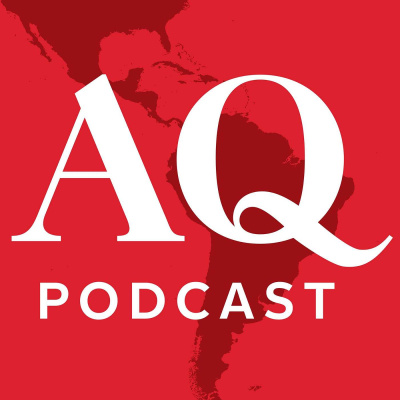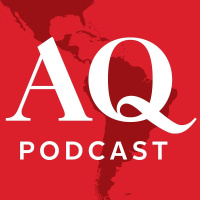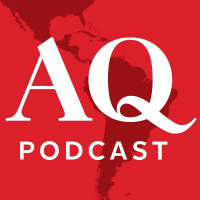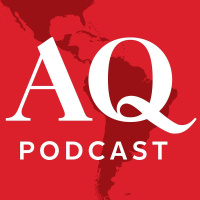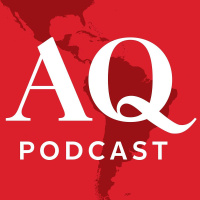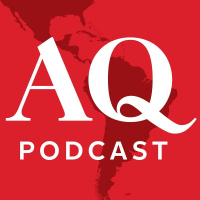Sinopsis
A podcast focused on Brazilian politics and economics hosted by Brian Winter, editor-in-chief of Americas Quarterly magazine and vice president of Americas Society / Council of the Americas.
Episodios
-
Ways Forward for the Amazon
03/02/2023 Duración: 26minWith the election of Luiz Inácio Lula da Silva for a third term in Brazil, the international community expects the country to curb the aggressive deforestation and criminal activity seen in the Amazon in recent years. The path ahead will require astute political negotiations, argues this week's guest, Ilona Szabó, the founder of Instituto Igarapé, a think tank focused on security and development. Ilona talks to us about her expectations for Brazil's incoming government, prospects for cooperation with other Amazon nations, such as Peru and Venezuela, and how the private sector should navigate investment in the region moving forward.
-
Peru’s Crossroads
26/01/2023 Duración: 25minPeru's crisis continues to rage, with protests almost daily on the streets of Lima. A long history of issues explains the current situation. Peru’s economic model brought growth and reduced poverty, but fell short of truly enfranchising the country’s most marginalized; the country’s political parties are considered by many to be dysfunctional. In this episode, Brian Winter and Luis Miguel Castilla, a former finance minister of Peru between 2011 and 2014, analyze what brought the country here and assess what might come next. Castilla argues for a middle ground that addresses the legitimate demands of Peruvian society for greater social protections and rights without throwing out the economic framework that allowed Peru to grow almost uninterruptedly for decades.
-
Lula’s Challenging Path Forward in Brazil
19/01/2023 Duración: 32minFollowing attacks on Brazil’s capital, the focus is on putting the country back together. The challenges are immense and wide-ranging: how to deal with security forces, parts of which supported insurrectionists, and how to handle Brazil’s growing radicalized groups, without overreacting and deepening division in an already polarized public. In this episode, Brian Winter and Patricia Campos Mello analyze the current political scenario, taking stock of the insurrection and looking ahead to what it means for President Luiz Inácio Lula da Silva's governability, as well as the challenges he will face in other areas. Patricia, a journalist at Folha de S.Paulo, Brazil’s leading newspaper, is one of the country’s most respected reporters and an expert on the intersection of social media and politics, as well as Brazilian foreign affairs.
-
The White House’s Juan Gonzalez on Mexico Relationship, Venezuela and More
09/01/2023 Duración: 01h02minU.S. President Joe Biden is in Mexico this week, at a time when the administration is facing a host of issues around Latin America. In this special episode, Brian Winter and the White House's Juan Gonzalez discuss a number of them: disputes with the Mexican government over energy policy; changes in the Venezuelan opposition; new developments in the relationship with Cuba; expectations for Brazil's incoming government and what, if anything, defines Biden's approach to Latin America today.
-
How China’s Presence In Latin America Is Changing
05/01/2023 Duración: 29minIn the last two decades, China has been a fundamental part of Latin America's economies. But the relationship is far from static. In today’s episode, we’ll look at how trade and investment flows changed in recent years and explore Beijing’s goals in the region. Our guest, Felipe Larraín, is a former two-time finance minister of Chile and a professor of economics at Universidad Católica de Chile. He evaluates recent trends and future trajectories for direct investment, official lending, trade and infrastructure; analyzes how the region's countries should, in his opinion, position themselves in the China-U.S. dispute; and discusses what has surprised him the most about Sino-Latin America ties.
-
Bonus Edition: What Victory Means for Argentina
19/12/2022 Duración: 19minAfter over 30 years, Argentines can finally say, once again, that they are the world's football champions. The victory brought millions to the streets in celebration, at a time when the country is going through economic and political troubles. What does it feel like to be there this week? What consequences, if any, could this have for the economy and for politics? Will the atmosphere of national unity witnessed in recent days soothe tensions in a highly polarized society? In this episode, Argentine political scientist and football fan María Esperanza Casullo, a professor at the National University of Río Negro, shares her reflections after her country's third World Cup win.
-
What Does 2023 Hold for Latin American Economies?
15/12/2022 Duración: 29minIn this episode, Brian Winter and Alberto Ramos, head of Latin America economic research at Goldman Sachs, assess the state of the region's economies as we head into 2023. Why were numbers for 2022 better than expected, and why didn’t it feel that way for many? What should governments do to avoid headwinds in 2023? How might external factors, such as the war in Ukraine, economic activity in China and U.S. interest rates impact Latin American finances? Hear Ramos’ expectations for Latin America as a whole and specific analysis on Brazil, Colombia, Argentina, Peru and Chile.
-
Moisés Naím on Latin America’s Bright Spots and Challenges
08/12/2022 Duración: 27minIt’s been a difficult decade for much of Latin America, but there are also some causes for optimism. As 2022 draws to a close, Moisés Naím, one of the region’s most respected and followed political commentators, provides an overview of where things stand. In a conversation with Brian Winter, Naím discusses the struggles of democracy, as well as recent developments in Venezuela, his home country. Naím is the author of the book The Revenge of Power, which chronicles the rise of autocratic leaders in recent years and was recently named by the New Yorker magazine as one of the best books of 2022. He is a Distinguished Fellow at the Carnegie Endowment for International Peace, a columnist for El País and a member of Americas Quarterly’s editorial board.
-
"A Make-or-Break Moment For Mexican Democracy"
30/11/2022 Duración: 31minRecent protests have illuminated a political divide in Mexico. First, thousands took to the streets to protest against President Andrés Manuel López Obrador's plan to overhaul the country's elections authority, the INE, or Instituto Nacional Electoral. Two weeks later, AMLO himself called a march to celebrate his four years in office, a move read by many as an attempt to showcase political strength. Why are some critics calling this a "make-or-break" moment for Mexican democracy? In this episode of The Americas Quarterly Podcast, Brian Winter and political commentator Carlos Bravo Regidor discuss what is at stake in the confrontation over the INE, what to expect from the 2024 elections and Mexico’s relationship with the United States.
-
Argentina: Trying to Avoid Another 2001
16/11/2022 Duración: 33minMemories of the December 2001 protests in Argentina arise whenever the country's social, economic and political crises deepen. Now, conditions are ripe for restlessness: inflation is nearing 100%, there are protests in the streets and the political scenario is convoluted. Could Argentina be close to another moment of social upheaval, similar to what happened in December 2001? In this episode, Brian Winter discusses popular discontent, the 2023 elections and Argentine foreign relations with Benjamin Gedan, deputy director of the Latin American Program at the Wilson Center, the director of its Argentina Project and a former South America director on the White House National Security Council during the Obama administration.
-
Lula’s Plans for a Divided Brazil
10/11/2022 Duración: 23minThe election in Brazil is over, but the country remains divided and there are considerable challenges ahead for President-elect Luiz Inácio Lula da Silva. In this episode, Brian Winter speaks with political reporter and columnist for O Globo newspaper Malu Gaspar about how a possible institutional rupture was averted, what Lula's priorities will be and what he will face while trying to reunite Brazil's political class and address the country's economic, social and environmental problems.
-
Is Bukele or Boric the Future of Latin American Politics?
03/11/2022 Duración: 26minMillennials account for 23% of Latin America’s population, or roughly 155 million people. Two of them are already at the helm of their countries, Gabriel Boric in Chile and Nayib Bukele in El Salvador. They represent starkly different political projects - the latter more authoritarian, the former, democratic. Which vision is more likely to prevail in the coming years? How is this generation changing politics in the region? In this episode, Andrea Moncada, a millennial Peruvian journalist and the author of a piece that tries to answer that question joins Brian Winter to discuss who are millennials in politics, how their priorities differ from that of previous generations and what their ascendancy means for the future of the region.
-
How Evangelicals Are Transforming Politics in Latin America
27/10/2022 Duración: 32minThe spread of evangelical Christianity is changing politics in Brazil, Peru, Chile, Bolivia and elsewhere in Latin America. In this episode of The Americas Quarterly Podcast, we do an examination of how far this has gone in a number of countries, from Brazil to Guatemala, and what it means for future elections in the region. Our guest, Professor Taylor Boas, is the author of Evangelicals and Electoral Politics in Latin America: A Kingdom of This World, which is expected to be published in February. Professor Boas argues that we are likely to see a stronger alliance between evangelicals and Catholics, and that while there have been electoral successes, evangelicals may actually be losing the culture wars in the region.
-
Former President Solís on Central America: The Good, the Bad and the Ugly
20/10/2022 Duración: 31minThe backsliding of democracy is a reality in many parts of the world, and Central America has been no exception. Nicaragua is under an authoritarian regime. El Salvador’s President has announced he will run for reelection despite his country’s constitution forbidding it. And even in Costa Rica, once seen as a bastion of stability, there have been worrying signs. What is pushing this trend in the region, and what are the efforts to reverse it? In this episode of The Americas Quarterly Podcast, Brian Winter and former President of Costa Rica Luis Guillermo Solís analyze the political scenario in Nicaragua, El Salvador, Honduras, Costa Rica and Guatemala.
-
New Unrest in Cuba: What it Means
13/10/2022 Duración: 29minCuba is facing a mixture of short-term and long-term problems. Hurricane Ian has devastated the island. This came amid a long period of setbacks, including a deep economic contraction and a severe migration crisis. In recent weeks, Cubans have taken to the streets. Is the country headed for even greater instability? How, if at all, could the relationship with the United States change? And is there an existential risk to the Cuban government itself? In this episode of The Americas Quarterly Podcast, Brian Winter speaks to political scientist Javier Corrales about the island's predicament and what might happen next.
-
Brazil’s Surprising Election: What’s Next?
05/10/2022 Duración: 26minBrazil's election results were much tighter than many predicted and former President Luiz Inácio Lula da Silva and President Jair Bolsonaro are headed to a runoff on October 30. Although Lula is still a slight favorite, Bolsonaro has received key endorsements and bolsonarismo showed its strength, winning majorities in the House and the Senate as well as key governorships. In this episode of The Americas Quarterly Podcast, Brian Winter speaks to Sarah Maslin, Brazil correspondent for The Economist, about what explains the results and what we can expect from the campaign moving forward.
-
Gustavo Petro: What We’ve Learned So Far
28/09/2022 Duración: 30minColombian President Gustavo Petro was elected promising huge reforms. But since taking office, he has given mixed signals regarding how far, and how fast, his government might change Colombia’s economy, society and role in the world. Will the country’s class structure be significantly altered? Will there be a shift in drug policy? Will Colombia drop oil and coal from its energy matrix? And how much support do his proposals have? In this episode of The Americas Quarterly Podcast, Ricardo Ávila, senior analyst for the newspaper El Tiempo, takes stock of Petro’s first months as head of state and assesses how transformative his presidency could be.
-
A Reset for Chile and Gabriel Boric
14/09/2022 Duración: 27minAs the dust begins to settle on Chileans’ emphatic rejection of their proposed new constitution, the political class has started negotiations for a new process. What provisions is the new charter likely to contain? Who might write it? Where does the rejection leave the young leftist president Gabriel Boric, and what will happen to Chile’s troubled economy amid such uncertainty? Isabel Aninat, Dean of the Faculty of Law at Adolfo Ibáñez University, answers these and other questions on this episode of The Americas Quarterly Podcast.
-
Brazil’s Election and the Risk of an Institutional Standoff
01/09/2022 Duración: 28minBrazil’s election is now entering its final stage, and President Jair Bolsonaro is consistently trailing former President Luiz Inácio Lula da Silva. If the trend prevails, will Bolsonaro concede? Many in Brazil think he will not. In this episode of The Americas Quarterly Podcast, veteran political analyst Thomas Traumman examines the final weeks of the campaign and what could happen next. He discusses the latest poll numbers, Bolsonaro's narrowing options for victory, the crucial roles of gender and religion in the race, as well as what to expect from the military if Bolsonaro contests the results.
-
Latin America’s New Pink Tide and a Look at Brazil
18/08/2022 Duración: 29minThere is an unmistakable trend in Latin American politics today: the left is in charge in some of the region’s largest countries — Chile, Bolivia, Argentina, Colombia and Mexico. Brazil, the biggest economy, could soon join this cohort if former president Luiz Inácio Lula da Silva wins the October election. This in many ways recalls the original pink tide of the 2000s. In this episode of The Americas Quarterly Podcast, international relations expert Oliver Stuenkel discusses what he expects from this new wave of leaders and what they represent for the region’s major economies and diplomatic relationships. He also gives his assessment of the presidential campaign in Brazil and what a Lula victory could mean for the region and for the new pink tide.
